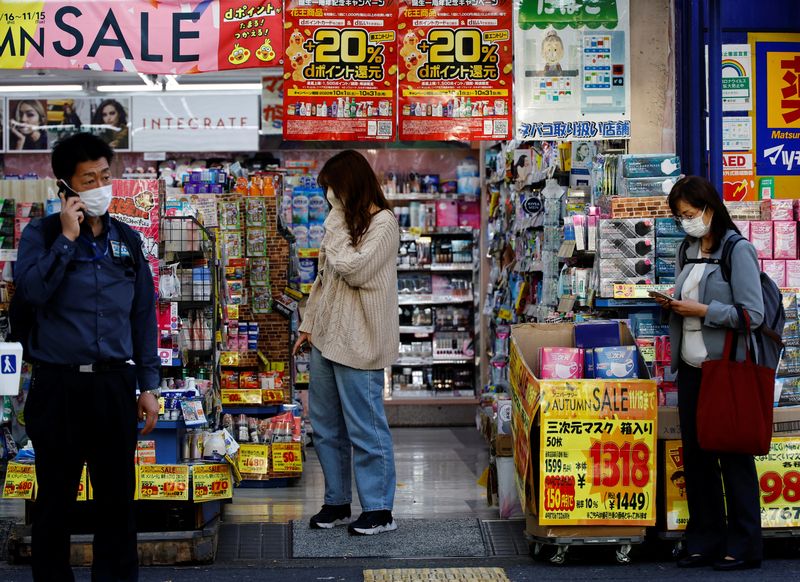By Tetsushi Kajimoto
TOKYO (Reuters) - Japan's core consumer inflation accelerated to a 40-year high in October, driven by currency weakness and imported cost pressures that the central bank shrugs off as it sticks to a policy of ultra-low interest rates.
The nationwide core consumer price index (CPI) was up 3.6% on a year earlier, exceeding the 3.5% rise expected by economists and the 3.0% gain seen in September.
GRAPHIC: Japan's core inflation hits 40-year high (https://graphics.reuters.com/JAPAN-ECONOMY/INFLATION/gdpzqydmbvw/chart.png)
It was the largest jump since February 1982, when a Middle East crisis stemming from the Iran-Iraq war disrupted crude oil supply and triggered a spike in energy prices.
The rise in the index, which excludes volatile fresh food prices but includes oil products, confirmed that inflation remained above the 2% goal of the Bank of Japan (BOJ) for a seventh consecutive month.
But economists do not expect the BOJ to join a global trend of raising interest rates, because it sees this year's acceleration in inflation as a cost-push episode that will fade as import costs stop pushing.
Foreign supply constraints have driven up prices of imported food, industrial commodities and manufacturing parts, and so has a fall in the yen, which in dollar terms is down more than 20% this year.
"I haven't changed my view that the rise will start to slow down soon," said Takeshi Minami, chief economist at Norinchukin Research Institute, noting declines in global grain prices. "I expect inflation to peak by year-end and the rise in prices to start diminishing in the new year."
BOJ Governor Haruhiko Kuroda reiterated on Thursday a pledge to maintain monetary stimulus to achieve wage growth and sustainable and stable inflation. The central bank is keeping long-term interest rates around zero and short-term rates at minus 0.1%.
The economy remains fragile as it recovers from the COVID-19 downturn. Also, Japan's inflation rate remains moderate by the standards of other developed countries.
BEER, SAKE UP
Kuroda has argued that global commodity costs account for half of the magnitude of Japan's price rises.
The October data showed raw-material price rises and the yen's weakness had driven a 15.2% increase in energy costs, while food excluding perishables was up by 5.9%, the fastest rise since March 1981.
Among food items, 88% were more costly than a year before, led by alcoholic drinks, such as beer and sake.
Prices of household durable goods were up 11.8%, their biggest rise since March 1975, driven by costs of transportation, raw materials and energy and by the weak currency.
The data suggests Japanese firms may be shaking off their deflationary mindset as they apply price rises to a broadening range of products. Of the 522 items composing the core consumer price index, 406 were more expensive in October than a year earlier. In September, 385 were.
The BOJ has forecast average prices for the fiscal year to March 2023 will be 3% higher than in 2021-22 but that the rise for 2023-24 will be only half as great, because commodity and other cost-push factors will have subsided.
In a sign subcontractors are struggling with wholesale price pressures, the corporate goods price index jumped 9.1% in the year to October.
